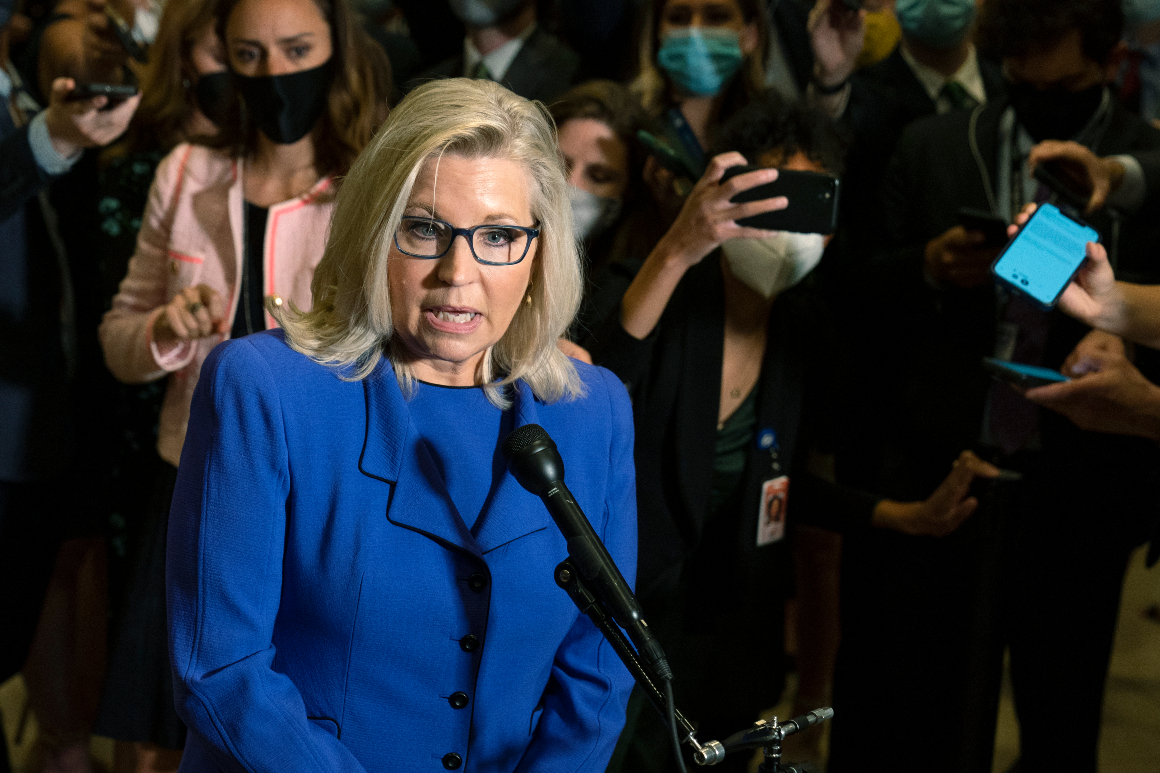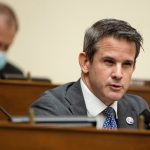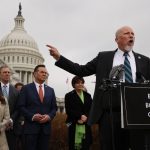At her last conference meeting as a House Republican leader, Liz Cheney delivered the morning prayer for the first time. She chose a Bible verse with a pointed message: “The truth shall set you free.”
“I thought a lot about the prayer,” an oft-quoted line from the New Testament’s Book of John, Cheney told POLITICO. “Normally I yield to another member to do that, but I thought that was very important that day.”
Fifteen minutes after she prayed, Cheney’s colleagues voted to strip her of power for consistently rejecting Donald Trump’s lies about the 2020 election, unleashing the Wyoming Republican on a long-shot mission to wrest her party from the grip of the ex-president.
After her high-profile ouster, Cheney now carries an even bigger megaphone and isn’t beholden to the shackles of leadership, whose members are expected to toe the party-line message in public. But what Cheney still lacks is the conservative cavalry she’ll need to chip at Trump’s influence on her party. Depending on whom you ask, Cheney either has a spine of steel or a streak of self-sabotaging stubbornness — and not all of her GOP admirers are ready to follow her lead.
As Rep. Virginia Foxx (R-N.C.) said at the meeting to boot Cheney: “If no one is following you, you are only taking a walk. You, Liz, are only taking a walk.”
Foxx’s remark was all the more stinging for its brutal assessment of Cheney’s political isolation: Other Republicans — even those who joined her in voting to impeach Trump — have been reluctant to replicate her outspokenness. The 54-year-old went from a Republican star viewed as a future speaker to a woman in exile who may struggle to hold on to her congressional seat, even as she keeps warning of the peril the former president poses.
”There’s usually three things that put you in the bull’s-eye of controversy. It’s your own ambition, somebody else’s ambition or things out of your control,” said Rep. Rodney Davis (R-Ill.), who described himself as a big fan of Cheney’s. When asked which one applies in her case, Davis responded: “All three.”
Despite the consequences, though, Cheney has no regrets. Not about voting to impeach Trump for inciting the Jan. 6 insurrection. And not about passing last year on a bid for the Senate, where her views on Trump may have made her fewer enemies in her party — or, at least, where she wouldn’t face reelection for another six years.
In some ways, it feels as though Cheney views her current place in the political wilderness as her destiny. And she is certainly embracing her role as a self-cast Cassandra, determined to speak prophecies no matter who’s listening.
“I’m really glad that I decided to stay in the House,” Cheney said. “As we’re engaging in these battles about principles and the future and standing up for truth, I think that these battles really are being fought out in the House.”
“When you look at history, it’s individuals who make a difference,” she added. “And I feel really honored to be able to stand up and speak on these issues that I think are going to determine the future of the country and the future of our democracy.”
But other Republicans aren’t so sure. They argue Cheney may have seen a brighter future, and surely a safer one, had she landed in the Senate.
"If she had run for the Senate and won, she’d be a rank-and-file senator. Would it be such a big deal? She’d be like Mitt Romney,” said Sen. Kevin Cramer (R-N.D.), who endorsed now-Sen. Cynthia Lummis (R-Wyo.) before Cheney decided not to enter the race. “She wouldn’t have a leadership position to lose, plus she’d have a six-year term. It’d be a lot different.”
Cheney, however, may have her sights set higher than the upper chamber. She has vowed repeatedly to do whatever it takes to stop Trump from becoming the GOP’s 2024 presidential nominee, even if it means challenging him herself. While she has repeatedly emphasized she’s focused on rebuilding her party, she isn’t ruling out a future White House bid.
During her post-ouster media blitz last week, she called into a New Hampshire radio station, further fueling speculation about her political ambitions.
Still, Cheney acknowledged the reality that an anti-Trump candidate would struggle to win in today’s GOP: “I’m very focused on changing that,” she said.
Even officially relegated to the sidelines, Cheney could still prove a constant thorn in House Minority Leader Kevin McCarthy’s side. In a fresh sign of their rift, Cheney also told POLITICO she wouldn’t vote for McCarthy for speaker if they win back the House majority next year.
“I think that we’ve got to have leaders who lead based on principle, and that’s not what we’ve seen from him,” Cheney said.
The elder daughter of former Vice President Dick Cheney has been known to harbor greater political ambitions. She briefly waged a primary bid against former Sen. Mike Enzi (R-Wyo.) in 2014 before passing on the chance to succeed him last year. As a freshman House member, she was prepared to challenge Rep. Cathy McMorris Rodgers (R-Wash.) for the No. 3 leadership spot before McMorris Rodgers decided not to run again, clearing the way for Cheney.
When Cheney declined to run for Senate early last year, her colleagues saw it as a sign that she wanted to climb the Republican leadership ranks in the House. Now, after her messy breakup with the House GOP, no one outside her inner circle knows where Cheney goes — although that hasn’t stopped her colleagues from endless speculation about her endgame.
Some Republicans suggested that a future president might prove more amenable to Cheney’s worldview and tap her for a Cabinet position. Others, when asked if she could ever hold a role in House GOP leadership again, pointed out that none other than John Boehner made it to the speakership after getting ousted as conference chair.
“I don’t think she’s political roadkill. She’s too smart and she comes from, obviously, a very powerful and well-respected family,” said Rep. Chris Stewart (R-Utah). “And Liz is going to find her pathway forward … But she just is not in sync with the rest of the conference.”
By the time Cheney was voted out as the No. 3 House Republican, she had alienated members across the political spectrum, from moderates to ultra-conservatives, by trying to spearhead GOP messaging while sharing her own personal anti-Trump sentiments. Some of her conservative critics are signaling that they will put up a fight if she ever tries for another House leadership position. And that’s unlikely to happen with McCarthy in charge, keeping the House GOP in lockstep with Trump for the foreseeable future.
“If she does [run again], that’s a sad day for the Republican Party — maybe in the Democrat Party,” quipped freshman Rep. Lauren Boebert (R-Colo.).
For now, Cheney’s primary focus is winning reelection in Wyoming, where pro-Trump forces are already mobilizing against her. She’s projecting confidence that she’ll win, even as her hometown newspaper asks if she is “beyond repair.”
When asked whether she has a Plan B, Cheney said simply: “I’m not gonna lose my seat."
If she can win, she would prove there are signs of life in the party for those who build an anti-Trump identity. But a Cheney loss would indicate that the GOP has fully calcified into the ex-president’s party.
Cheney also suggested she may support other candidates willing to call out Trump, though she said she currently has no plans for a leadership PAC. But even without a PAC, Cheney just raked in a record-breaking fundraising haul that will not only pad her own campaign coffers, but could allow her to help others. Hailing from a conservative political dynasty has offered her an elite donor network to tap into.
Some Republicans say they are certain Cheney has a plan, even if they don’t understand it yet.
“Your legacy gets written when you’re done. I don’t think Liz is done yet,” said Rep. Kelly Armstrong (R-N.D.).
While she has a small army of public defenders as Trump maintains his iron grip on the party, it could take another bad election cycle or two for her to see her forces grow inside the ranks of elected Republicans. And Cheney is under no illusions about how much work she has ahead to rip her party away from Trump.
“It’s going to require consistent hard work and effort by a lot of people, and a willingness by people to stand up and talk about what’s right,” said Cheney. “I don’t think that it’s certainly going to happen overnight.”
Burgess Everett contributed.





















